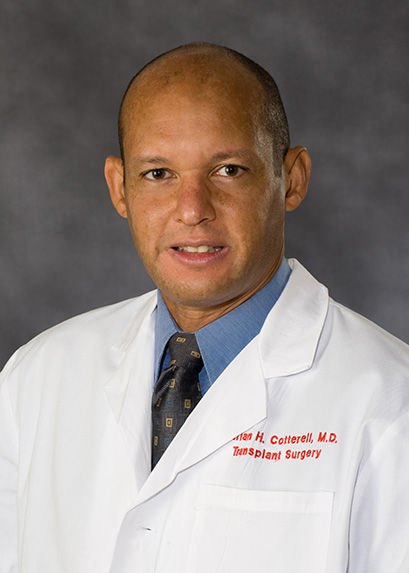A doctor whose reward is helping others
Adrian Cotterell, M.D., says the most fulfilling part of being an abdominal transplant surgeon is seeing the life-saving results of the care that he and his colleagues provide.
“Being part of a team that gives patients a second chance at life is what fuels my dedication to transplant surgery,” he says.
Cotterell has been a surgeon at the VCU Health Hume-Lee Transplant Surgery Team for more than two decades, where he transplants livers, kidneys and pancreases. During his time here, he’s been the surgery director of all three of those organ transplant programs and has put countless patients on the road to better health.
He treats people who have end-stage kidney disease, liver cancer, cirrhosis as well as hernias, bile duct injuries and type 1 diabetes. He does the delicate work of removing organs from living donors and also performs the procedures that place a new organ in the receiving patient.
Cotterell sees patients of all ages, including adults at VCU Medical Center Main Hospital as well as kids at the Children’s Hospital of Richmond. Patients credit him for his quick thinking, preparation and life-saving care.
“They don’t make surgeons better than him,” one of his patients said in response to a Hume-Lee social media post about surgeon. Said another: “I am forever grateful to him.”
Cotterell is active in researching the field of transplant care and has participated in numerous studies and presentations about pancreatic islet cell transplantation, the prevalence of the onset of diabetes following a kidney transplant, long-term immunosuppressive therapy in kidney transplantation, pediatric liver transplants, liver regeneration and numerous other topics.
Cotterell, who has been featured on Richmond Magazine’s Top Docs, also serves as the director of VCU Health’s Transplant Surgery Fellowship. In that role, he guides new surgeons on how they train to care for “the most vulnerable of patients.”
Research Interests
Kidney and liver living donor transplants, pancreas transplantation, pediatric transplants, dialysis access, hepatobiliary surgery, hepatitis C infections and kidney transplantation, liver transplants for people living with cirrhosis and hepatocellular carcinoma.
